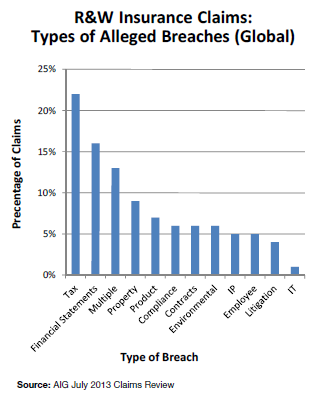The following post comes to us from Jeremy S. Liss, partner focusing on capital markets and mergers and acquisitions at Kirkland & Ellis LLP, and is based on a Kirkland publication by Mr. Liss, Markus P. Bolsinger, and Michael J. Snow.
Private equity funds are increasingly using representations and warranties (R&W) insurance and related products (such as tax, specific litigation and other contingent liability insurance) in connection with acquisitions as they become more familiar with the product and its advantages. [1] Acquirors considering R&W insurance frequently raise concerns about the claims process and claims experience. A recent claim against a policy issued by Concord Specialty Risk (Concord) both provides an example of an insured’s positive claims experience and highlights the possibility for a buyer to recover multiple-based damages under R&W insurance.
R&W Insurance Advantages
Under an acquisition-oriented R&W policy, the insurance company agrees to insure the buyer against loss arising out of breaches of the seller’s representations and warranties. The insurer’s assumption of representation and warranty risk can result in better contract terms for both buyer and seller. For example, the seller may agree to make broader representations and warranties if buyer’s primary recourse for breach is against the insurance policy, and the buyer may agree to a lower cap on seller’s post-closing indemnification exposure as it will have recourse against the insurance policy. In addition, R&W insurance often simplifies negotiations between buyer and seller, resulting in a more amicable, cost-effective and efficient process.
Claims Experience
As repeat participants in a competitive insurance market, established R&W insurers have an incentive to act reasonably when responding to a claim. In order to continue to attract business, an insurer seeks to enhance its reputation as a reliable counterparty that pays valid claims under its policies. As a result, an insurer is subject to market pressures that do not similarly influence a one-time seller when facing an indemnification claim under an acquisition agreement.

A Kirkland client’s recent acquisition experience is instructive. Buyer acquired target using R&W insurance issued by Concord. After closing, buyer discovered that seller had breached its financial statements representation, leading to an inflated EBITDA figure and, therefore, purchase price (which had been calculated as an EBITDA multiple). Buyer made a claim under the policy for the breach, seeking damages based in part on the purchase price multiple of the EBITDA misstatement. Buyer and Concord settled the claim for an amount that was based in part on the multiple of misstated EBITDA, which buyer felt appropriately reflected the damages it suffered as a result of the financial statement misrepresentation.
Multiple-Based Damages
During an acquisition agreement negotiation, the parties frequently heavily negotiate buyer’s right to recover consequential, special and indirect damages and damages based on a multiple. Some sellers insist that buyer waive the right to recover such damages, and some buyers are unwilling to proceed if the contract limits buyer’s right to indemnification for any and all damages recoverable at law. When a contract includes categorical damage waivers (including consequential and multiple-based damages), a buyer may not be fully compensated for the decreased value of its investment arising out of a breach of a seller’s representations and warranties. Indeed, buyers often assert that excluding multiple-based damages in a transaction where buyer has priced the target based on an earnings multiple can deprive it of protection against breaches of the representations and warranties most important to its pricing decision (e.g., financial statements and customer relationships).
In the case cited above, R&W insurance allowed buyer to protect itself against a breach of such “pricing” representations and warranties and receive appropriate compensation for its purchase price overpayment, while avoiding a difficult discussion with seller over damage limitations. In deals where the disagreement between buyer and seller on the issue of categorical damage exclusions appears intractable, R&W insurance may help facilitate a satisfactory resolution.
Endnotes:
[1] One major carrier recently reported a 40 percent increase in 2012 R&W insurance over 2011. Jay Rittberg, “M&A Insurance Heats Up Despite Lower Deal Volumes,” Advisen Management Liability Journal, September 2012, at 11, 11.
(go back)
 Print
Print